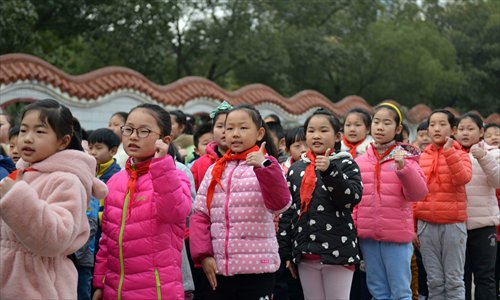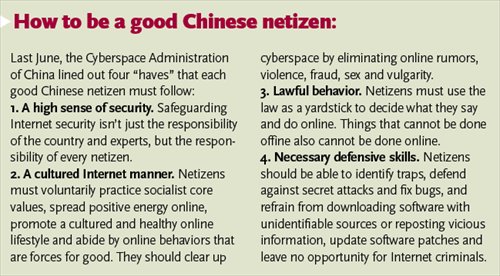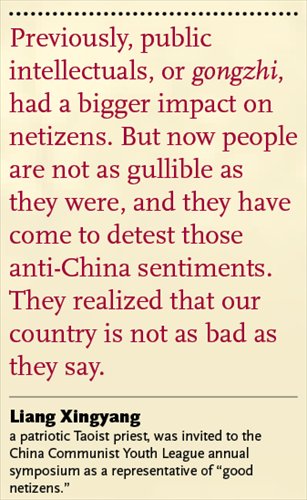China recognizes ‘good netizens’ who spread ‘positive energy’
China's cyberspace authorities are launching a five-year, nationwide campaign to foster "good netizens" who help spread "socialist core values" and "positive energy" online. Patriotic netizens who defend China and the government are expected to become an increasingly dominant force on China's blogosphere.

Students learn socialist core values at the Lu'an Primary School in Hefei, Anhui Province, on February, 19. Photo: IC
The Central Committee of the China Communist Youth League (CCYL) recently invited 15 bloggers to its annual Youth Day symposium on May 4 in Beijing - as representatives of China's "good netizens."
The invited netizens included Liang Xingyang, a "patriotic Taoist priest" who is known for his outspoken comments and articles on Weibo that defend the Chinese government when controversies occur, and Wufeng Jifeng, a singer and songwriter who writes patriotic pop songs and often repudiates negative comments about China's revolutionary history.
The bloggers, along with other youngsters who have won awards for their contributions to online discourse, were offered a rare meet with a top official - Vice President Li Yuanchao - who encouraged them in a speech.
Recognizing and honoring "role model" netizens is part of China's latest effort to "clean up" the online environment and boost "positive energy" through a campaign called "Be a good Chinese netizen."
The campaign, which officially started in March, will last five years, according to the Cyberspace Administration of China (CAC), its main organizer. Launched with the approval of President Xi Jinping, the project aims to foster a group of "good netizens," establish "model Internet platforms" and "good netizen" Internet campaigns, among others.
According to Lu Wei, director of the CAC, a good netizen should have high concern for Internet security, practice "socialist core values" and exhibit good Internet etiquette, among other requirements.
A variety of good netizen campaigns are currently being held at the provincial and city levels. On May 10, for example, over 100 universities and colleges in Northwest China's Shaanxi Province kicked off their campaign in partnership with Shaanxi's Provincial Cyberspace Administration. Students will be encouraged to submit positive stories that happened in their universities, participate in photography contests and other activities. On the same day, the Ministry of Public Security organized an event honoring official and personal Weibo accounts in the public security system that have helped spread "positive energy."
These campaigns are in line with President Xi Jinping's recent speech at a symposium on cyber security and informatization on April 19, when he said that cyberspace should "be imbued with positive energy and mainstream values, in the hope of creating a clean and righteous environment," the Xinhua News Agency reported.

Official recognition
Liang, a 37-year-old Taoist priest who lives in the Temple of the Golden Immortal in the Zhongnan Mountains, Shaanxi Province, said he was honored and excited to be invited to the event.
"We represent the group on the Internet who want to spread positive energy as the public opinion environment changes. You know how good news never goes beyond the gate, while bad news spreads far and wide. It's difficult to spread good news [about China], which is what we're trying to do," he told the Global Times, adding that "good netizens" come from various walks of life but share the same values and ideals.
Liang sprang to fame in the cyber world last year, when he famously rejected a US official's claim that China's reclamation in the South China Sea damaged the feng shui of Southeast Asia. In a blog post, Liang argued that the reclamation actually benefits the area's feng shui. Since then, he has become a prominent participant in online debates concerning China, with nearly 340,000 followers on Weibo.
Liang sees being invited by the CCYL as official recognition and approval of his actions. "I feel empowered - previously, we didn't know how far we can go and what kind of support we can get," he said.
This week, when news broke about 29-year-old Lei Yang, who died while being driven to a police station, which drove netizens to question the police's law enforcement procedures, Liang initially remained quiet. After some netizens accused Liang of being "selectively patriotic," Liang responded with an article saying he chooses to believe in the police.
"We cannot have the preconception that Lei didn't do anything wrong and the police set him up, and stand opposite the government in the beginning," he wrote.
Liang thinks the future is rosy for "patriots." "Previously, public intellectuals, or gongzhi, had a bigger impact on netizens. But now people are not as gullible as they were, and they have come to detest those anti-China sentiments. They realized that our country is not as bad as they say," he said.
Patriotic netizens have become an increasingly powerful force on Weibo, China's crowded opinion marketplace. Last September, prior to the military parade to commemorate the 70th anniversary of the War of Resistance against Japanese Aggression (1931-45), patriotic netizens organized a hashtag campaign on Weibo called "safeguard the military parade with your fingers."
A netizen called Qianjunke said in an article that Chinese netizens should recognize the huge importance of the parade, and "goose step" together on the Internet to safeguard the event. Over 400,000 netizens have since then participated in discussions with the hashtag, praising the parade and China's growing power.
Beside the effort to encourage "good netizens", the Ministry of Public Security and Sina Weibo on Thursday jointly launched an online platform for tips from netizens on false online information and will release monthly reports to publicize such rumors and related data.
The platform allows netizens to provide links or upload screenshots of alleged false information on any social media platform, including Sina Weibo and other online forums.

The spring for ziganwu
Liang's opinions are shared by Wufeng Jifeng, a singer-songwriter from South China's Guangdong Province who was also invited to the symposium. Wufeng said recent events mark the victory of the ziganwu.
The term ziganwu stems from the phrase "50 centers," those who are allegedly paid to cheer on the authorities online. Ziganwu, literally "50 centers who bring their own food," refers to people who voluntarily present a Chinese nationalist viewpoint online and like to use reasonable arguments to persuade others.
"The microphone of the grass roots belongs to ziganwu - a prominent change is that ziganwu have now become a unified force to fight against public intellectuals," he wrote in a recent article, and referred to the recent battles against liberal historian Feng Wei and property tycoon Ren Zhiqiang as two victories. Feng's articles on China's revolutionary history and Ren Zhiqiang's outspoken online comments defying the Party policies have both angered the ziganwu.
"Ziganwu used to be a marginalized group even though they have been there for a long time. Now they are officially taking center stage," he wrote.
The government has shown increasing support for the ziganwu. A commentator from Anhui's Provincial Publicity Department recently wrote in article this January that "good netizens should dare to be 50 centers, to hit the 'Like' button, and be happy to become a ziganwu. They should be a powerful force in positive voices on the Internet and delivering mainstream values."
In November 2014, in an opinion piece published in the Guangming Daily, Zhao Shibing, a commentator from Harbin Normal University, said ziganwu are netizens who voluntarily spread positive social energy and encourage China's development. "To clear China's Internet space, more ziganwu need to step out," he wrote in the article entitled "Ziganwu: Staunch practitioners of socialist core values."
But the leftist stance of many ziganwu has also caused alarm. A netizen who called himself "Cultural Revolution veteran" said in an article that ziganwu are the red guards of the 21st century. "Just like red guards who targeted capitalists 50 years ago as their imaginary enemy, ziganwu today are now targeting elites and public intellectuals as their imaginary enemies," he wrote.
On zhihu.com, a Quora-like questions-and-answers website, one user called Yinghuo Shouxin said ziganwu are people who like to talk about politics and yet lack basic knowledge of political science.
Newspaper headline: Online army